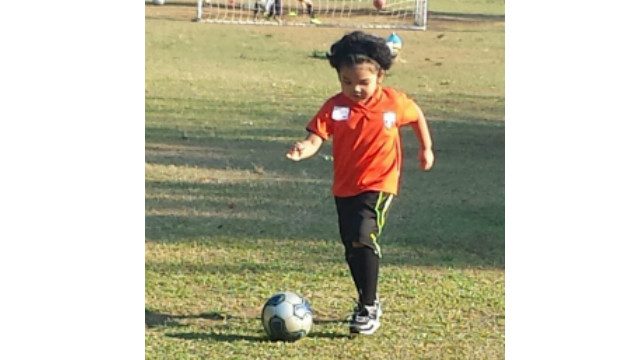SUMMARY
This is AI generated summarization, which may have errors. For context, always refer to the full article.

MANILA, Philippines – Parenthood is never easy especially when raising a young child who is very curious about the world. But it is the early stages of a child’s development that is critical for both parent and child, which is why being aware of how to better care for your child will help them achieve the best version of themselves.
Parents take on the responsibility of guiding their children every step of the way, from their first step to their first words, and provide them with only the best care possible. It’s important for parents to be involved in their children’s activities so that they can discover milestones along the way and ensure holistic brain development. (READ: Step by step: Mom and dad’s guide to their child’s firsts)
But parents can’t do this alone. They also need expert advice to make sure that their child is getting the right amount of nutrients and is doing activities that develop the four critical skill areas of the brain: intellectual, motor, emotional and social. These areas are best developed with proper nutrition and stimulation.
When the brain’s four critical skill areas are properly developed, your child may be given the 360 Advantage.
Hands-on mom
Leila De Guzman is a business owner and full-time mother to a 5-year-old son named Tyler. She is a very hands-on mom since she has no nanny or household help. “I attend to my son’s daily needs 24/7, household chores [and] on top of that, I have a business to attend to,” she says. Her priority is her son and she adjusts her errands so that she can bring her son along. If needed, Tyler’s father files for a leave to watch over their child while she attends spontaneous engagements.
Leila knows how important her role is as a mother and it goes beyond being there for her child. She prepares his food every day and tries her best to make sure he eats well. “As much as I would like to feed him with nutritious food, most of the time I give in to what he wants to eat (viand) just so he would eat. To compromise, he drinks vitamins and 2-3 glasses of milk every day.”
Given that Leila’s son is not yet fond of eating what is served to him, his doctor recommends milk that contains DHA or docosahexaconic acid, which is essential for the growth and function of the brain in children, and the maintenance of normal brain function in adults. [1] DHA also promotes healthy eye function and development, which Leila is aware of.
The omega-3 fatty acid is present in fatty fish such as salmon, tuna and mackerel as well as eggs and meat. Other than DHA, children also need nutrients such as iron, carbohydrates, protein and calcium. (READ: Growing with your child)
Experts advise parents to ensure that their children get adequate nutrition and have regular check ups with their doctors to make sure they are on the right track in terms of brain development. And to accompany proper nutrition is stimulating the learning process and allowing children to discover the world at their own pace.
The learning process
“Sometimes I read books and blogs and ask my friends for advice but that’s about it. Parenting is a learning process and you get to learn how to adapt/adjust to the situation,” Leila said. She and her siblings lost their parents at a young age and had no one to talk to about parenting. She simply had to become one and learn on her own.
“Even if I am a first time mom, I never had any fear or issues from the start. I have watched my parents take care of us, and have 2 younger siblings who I also helped take care of,” she says. When she had her son at 29, she believed she was more than ready to become a mother.
 To help stimulate her son’s learning, she sets aside some of her time to help him with schoolwork and enrolled him at school at a young age to help develop his social skills and encourage independence. She knows how important it is for young children to be exposed to different environments and satisfy their curiosity.
To help stimulate her son’s learning, she sets aside some of her time to help him with schoolwork and enrolled him at school at a young age to help develop his social skills and encourage independence. She knows how important it is for young children to be exposed to different environments and satisfy their curiosity.Leila is aware of the four critical skill areas of the brain and have taken steps to further develop them for Tyler.
As an only child, her son gets ample attention and supervision, which he needs for learning and developing new skills. For the intellectual area, technology plays a big part in stimulating his learning abilities, but she still supervises her son. She also allots at least an hour a day, even on vacation, to help him with his academics.
 In addition, Leila and her partner enrolled their son in sports, bring him to activity centers and arrange play dates to develop his motor skills. “His dad is more involved in this area since they can both be rowdy.”
In addition, Leila and her partner enrolled their son in sports, bring him to activity centers and arrange play dates to develop his motor skills. “His dad is more involved in this area since they can both be rowdy.”When it comes to communication, Leila says that open communication is never too early to start and listening works both ways. “I make it a point to know everything that happened to him while he is in school.” His social skills are also developed as her son interacts with his peers and adults.
Expressing his feelings is just as important as communicating, but only up to a certain point. Leila says ‘no means no’ and tantrums are not tolerated.
Every child is different. Others may learn faster while others have different ways of learning new things. But the important thing is to guide them every step of the way. “[I want] to be able to watch him grow and be the best that he can be,” shares Leila. “I want him to be successful and happy with whatever he has chosen in his life and to be prepared with whatever life has to offer.” – Rappler.com
Reference:
[1] http://www.ncbi.nlm.nih.gov/pubmed/10479465
In today’s environment, it is important for your child to receive holistic brain development in four critical skill areas: Intellectual, Motor, Emotional, and Communication. Enfagrow A+ Kid’s Brainergy Complex contains the highest levels of DHA* to support your child’s brain development in the four critical skill areas for the 360 advantage**.
To learn more, visit www.enfalearn.com.
*Brainergy Complex is a combination of DHA Power + and a Multi-Energy Blend. DHA Power + contains the highest levels of DHA among children’s milk brands and a unique blend of nutrients like Choline, Zinc, Iron, Iodine, and Vitamin B. Complementing this is the Multi-Energy Blend, a carbohydrate blend that is scientifically proven to provide sustained energy to the brain. Enfagrow A+ Kid has the highest levels of DHA of any children’s milk brand with 75mg in 3 servings for a day. With children’s usual diet, it helps meet expert-recommended daily DHA intake of 100-150mg DHA+EPA for children up to 4 years old or 150-200mg for 4 years old and above. Reference: FAO 2010. Fats and fatty acids in human nutrition. FAO Food and Nutrition Paper 91. FAO: Rome.
**Appropriate nutrition and stimulation of the child’s senses are critical to his/her development.
Add a comment
How does this make you feel?
There are no comments yet. Add your comment to start the conversation.